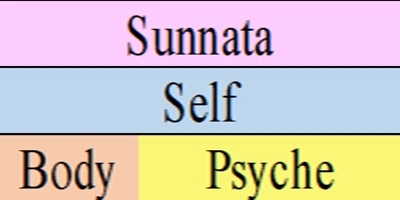Mind & Brain Frustration
I began watching a BBC Horizon programme on Insight, and as usual ended up with the usual frustration about brain science.
The format of the programme was to look at current research on insight, and that research typically examined the location of brain activity when insights were supposed to have happened. Begrudgingly I recognise that the science is showing that certain areas of the brain react when insight occurs.
When considering brain science like this my first question is always concerned with the nature of mind. Insight would tacitly be accepted as coming from the mind, but what is the connection between mind and brain?
In science there is again a tacit assumption that the mind is located in the brain, but if I ask Thai people where the mind is they point to the heart.
In the case of this Horizon investigation I suggest there is a tacit assumption that when the location of insight in the brain has been found then the source of insight has been found. I am certain I am expressing the tacit assumption too strongly, but that assumption is there to some extent. But it is an assumption, and it is an assumption that I can cast some doubt on; I also note that from my personal experience I contend that assumption is not true.
There are corollaries to this brain science. If the location can be found can an insight be stimulated? What else are they going to do with this physical location?
It is not necessarily the fault of the brain scientist that this question of brain and mind has not been resolved, it is a fault of science and academia in general. "What is mind?"" is accepted as a philosophical question that science doesn't have to answer. So these brain scientists can proceed with their tacit assumptions because academia fails to reach an understanding of mind.
There is an empirical understanding of mind which comes from meditation. When people meditate then they become aware of their own minds and gradually learn more of its nature. In terms of this blogpost they learn that mind is not located in the brain. Hence the roots of this assumption of Thai people that the mind is in the heart because this is the populist Buddhist view of mind - not in my view what meditators say mind is. Now when I am considering meditation as an empirical method of understanding mind I am going against academia. And this is a big point. Academics do not know how their own minds function. I do not know how one can understand how the mind functions without meditating but I concede it is possible. But I would argue that in general academics don't understand their own minds very few going beyond the cognitive or analytical. Here is a meme showing how Buddhadasa viewed the mind:-

If as I contend academics do not understand their own minds and if academia does not understand mind and its relation to brain, how can there be meaningful investigation into insight?
I want to consider the interesting case of Jill Bolte Taylor and how this puts light on the relationship between mind and brain for insight. Here is her
TED talk.
I had forgotten what a phenomenal talk this was, and it was very clear that she was speaking from experience. Her talk was discussing the meaning of the left and right brain, what she called the serial and parallel processors. Are there lessons to be learnt concerning the connections between mind and brain? Her talk clearly points to the left and serial thinking, and right and parallel thinking. But does she talk of brain and mind connections?
During her stroke of insight did her mind reside statically in the brain or did her mind swap from left to right. Was she experiencing alternatively left-mind and right-mind, or was the mind hopping from left to right during the experience? I contend the second - without proof and the above meditation justification.
I am looking for a way that will make it obvious that my Buddhist understanding would prevail over the tacit assumption of brain science. I have not succeeded. When I have an insight, usually after meditation, it is because I have cleared my mind, focussed it (sometimes by mentally dropping it away), removed my ego and somehow have gained insight with a connection to sunnata because my mind is well-harmonised, this might show as some form of brain stimulation but for me that is the least of it. Sometimes in meditation I focus my mind in my heart, in other times I will drop it away in an effort to enable sunnata to flow into my body - this is a visualisation. I tend to think of mind as being amorphous, and that it moves around my body causing function sometimes consciously I move it sometimes unconsciously it is moved. As I have been unable to establish this I have just stated it as a contention.
I have not got over my frustration concerning brain science, in fact it is now worse because I was unable to establish my contention. My contentions are true for me, I wouldn't waste time with sophistry for its own sake, but there is no simple way for me to make it true for you.
My frustration leads to an interesting question. If a certain part of the brain is known to react during insight, can I move my mind to stimulate that area of the brain into an insight? This is a horrible question these brain scientists want. Aaaggh!! Not at all the direction I wanted.
I ain't doing it though. If I want an insight I am going to meditate.
Frustration!!!


